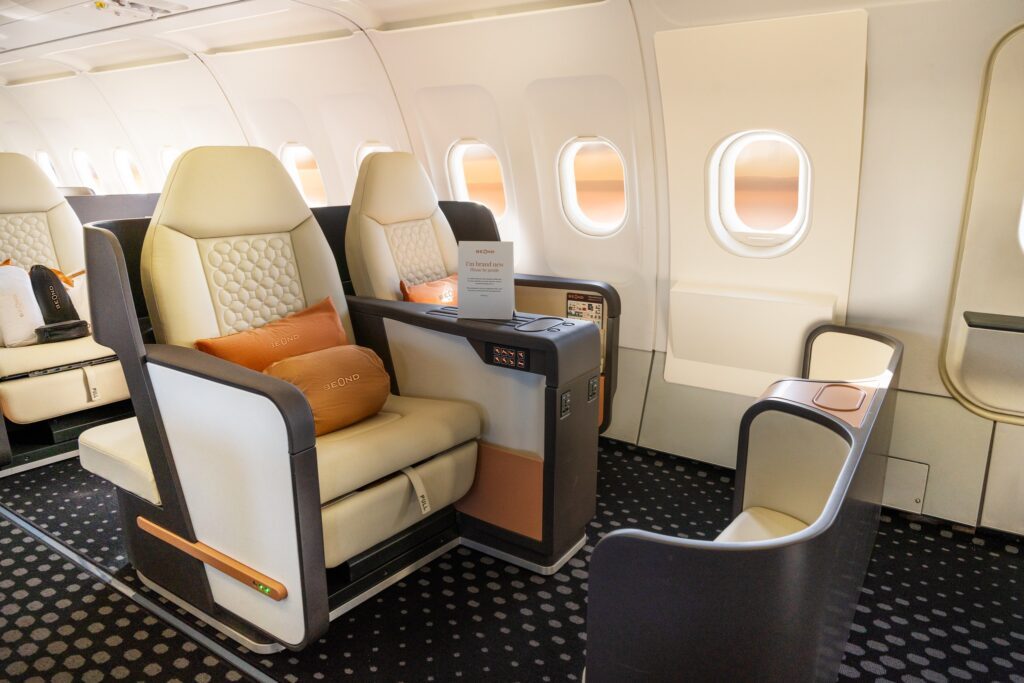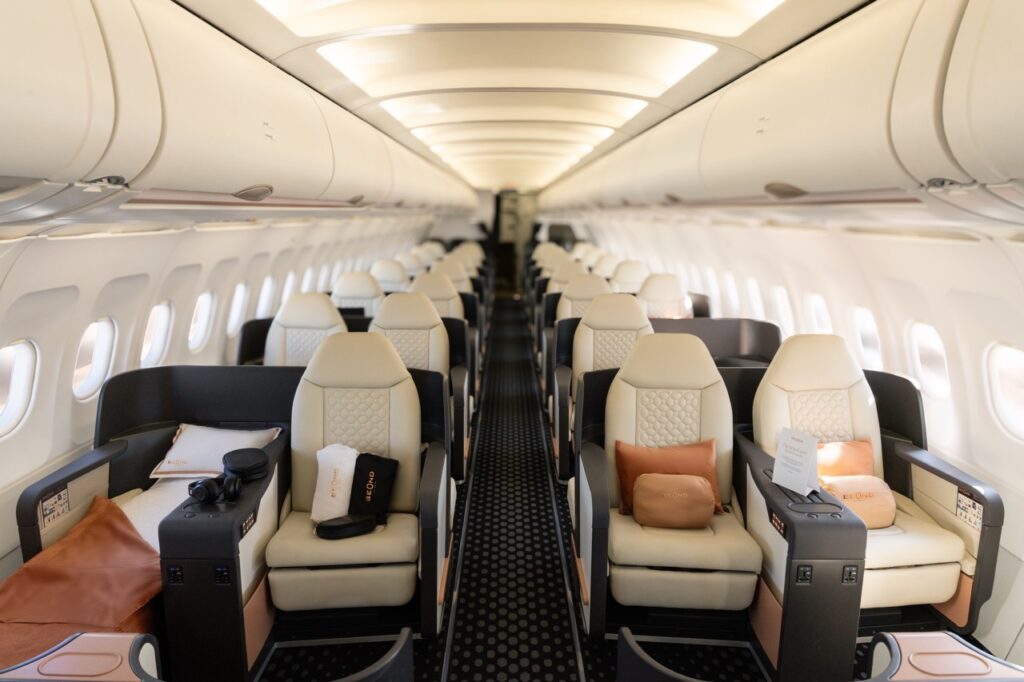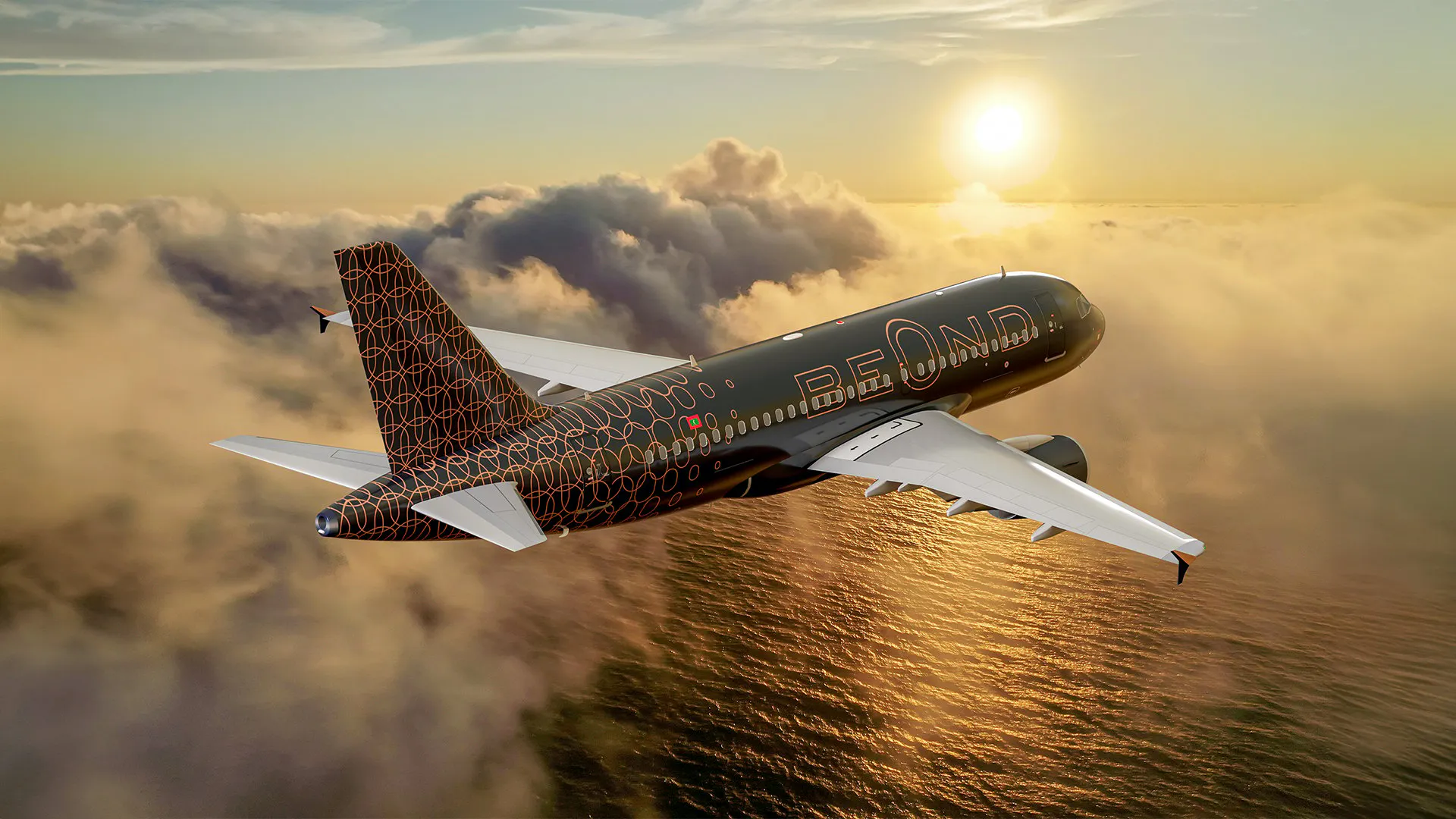Skift Take
If the business plan is to be believed, Beond Airlines could be a major threat to traditional operators before the end of the decade.
With corporate traffic slow to recover after the pandemic, wealthy leisure travelers are filling first- and business-class seats. They’re also paying handsomely for the privilege.
Now, one carrier is going a step further.
Dubai-based Beond Airlines is dedicating its entire aircraft to a super-premium leisure product. There’s no flimsy curtain here to separate the cabins; from the first row to the very back, every seat is a flamboyant lie-flat affair.
The onboard experience includes fine dining, with Beond-branded fine china from William Edwards and cutlery from Robert Welch. The airline also offers a limousine flight transfer service for certain flights. Think big private jet, without the big price tag.

The start-up launched its first revenue flights last November with its maiden service from Munich, Germany to the Maldives. Speaking at the time, Tero Taskila, the Beond CEO, said his firm sought to “redefine the skies, where luxury, comfort, and exclusivity are not just ideals, but realities experienced by every traveler.”
Taskila’s comments were admirable, but cynics questioned the long-term viability of such an operating model.
A New Plane; A Step Towards Credibility
After a modest start with just a single narrowbody plane, earlier this month the company confirmed that its second jet had arrived.
The plan is for this aircraft to fly new routes, building on existing services from Munich, Zurich, and Riyadh. According to the airline, Milan, Dubai, and Bangkok are all in its sights for “mid-2024.”
The freshly delivered Airbus A321 is being overhauled to bring it up to Beond’s premium specifications. There will be seats for just 68 passengers – barely a quarter of the 220 capacity in a more traditional all-economy configuration.

That said, the jet will still offer more space than Beond’s original Airbus A319, which can only carry 44 guests. This smaller model was once operated by British low-cost carrier easyJet – proof that even planes can have glow-ups in their later years.
Although these aircraft look slick on the inside, there’s no hiding the fact that they are still single-aisle airliners, more typically found on short-haul regional flights. As a result, Beond services from Europe to the Maldives usually require a tech stop in Dubai to refuel.
Huge Growth by 2030?
The company was founded in January 2022 and is a joint venture formed by the investment house Arabesque and SIMDI Group, a Maldivian hospitality firm. Describing itself as “the world’s first premium leisure airline,” Beond has enormous ambitions.
The business completed an oversubscribed seed round of $17 million in August 2023. According to the airline, early backers included family offices, angel investors, and strategic partners. Beond is now looking for investors for a series A round of $25 million, and every penny will be needed to realize its vision.
The goal is to have a fleet of 32 aircraft, all kitted out in private jet style, by the end of the decade. Although the Maldives is likely to feature prominently in its future network, Beond’s bosses are aiming to serve 60 global destinations within the next five years. This will see the company expand its footprint deeper into Europe, Asia-Pacific, and possibly Africa too.
Environmental and Economic Sustainability
Go beyond the glitz and you’ll find that the Beond business model has its critics. Not least from environmentalists, who say that more planes with fewer passengers is bad news for the planet. There are also doubters within the travel sector itself, who point towards other niche ‘all-luxury airlines’ that have failed to compete with more established brands.

One notable exception is Le Compagnie, an all-business class airline that connects European cities with the U.S. East Coast. It launched in 2014 and survived the pandemic, illustrating more fiscal resilience than some big-name airlines.
More traditional private jet usage is also on the rise. This comes despite increased scrutiny from some government officials and even certain airports, that have moved to ban business jets altogether.
Even with the arrival of its second aircraft, Beond is unlikely to be worrying the CEOs of Emirates, British Airways, or Lufthansa. It could triple in size and remain a tiny player. The real threat will come when, or perhaps if, it gains serious traction and Beond’s 60-destination business plan takes flight. The industry is watching but isn’t holding its breath just yet.
The Daily Newsletter
Our daily coverage of the global travel industry. Written by editors and analysts from across Skift’s brands.
Have a confidential tip for Skift? Get in touch
Tags: airbus, Beond Airlines, international luxury travel market, maldives
